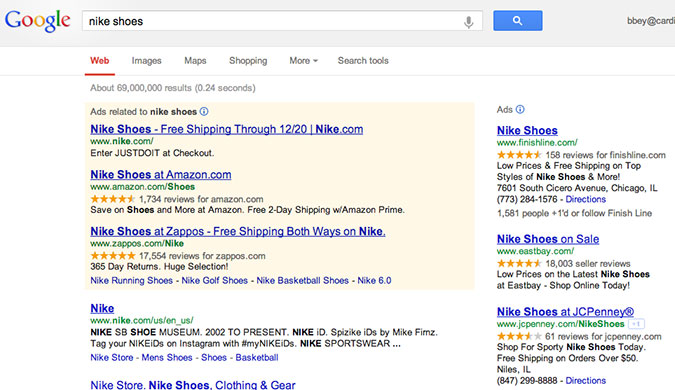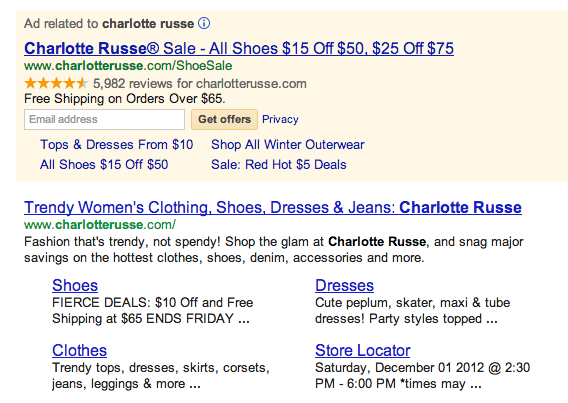“Why do I want to pay for my brand name?” is a question I’ve heard numerous times during my career in PPC. The last time was just last week during Cardinal Path’s AdWords & Analytics training. A business owner pulled me aside to ask why his marketing team was spending money on branded terms when his site was 5 out of the 10 organic results listed.
This issue has been highly debated, but I am going to tell you why I always say, “Yes, you should bid on branded terms”.
1. Rank First on the SERP. Ranking first organically is a coveted spot but if your competitors are running ads on your brand name, your site will be fourth on Google’s search page. Look at this screen shot of the SERP for “target bedding”.

Target’s organic listing isn’t even showing above the fold! Luckily, they have paid ads and product listing ads (both via AdWords) running, so they still have a presence on the page.
2. Challenge Your Competitors. You may think, “If someone searches for my company name, surely they are going to click on my site.” Possibly, but if competitors are bidding on your brand, they are going to try and give searchers a reason to come to their site instead.
Look at the example below for Nike:

Nike’s organic listing is surrounded by ads from resellers advertising the exact same products. If they weren’t running their own paid ad, customers would see at least 5 other ads touting free shipping, 365 day returns and low prices. They wouldn’t know Nike had free shipping as well, unless they actually clicked into the site.
Would you go to the Nike store when you could get the same product at Zappos with free shipping and returns?
3. Provide Searchers More Information. This is the only time I will say this phrase, but you’re wasting money bidding on branded keywords if all you’re going to do is run an ad with the same information offered in your organic listing. There are so many features available for paid ads: sitelinks, location extensions, product extensions, and more, and I can only imagine this will continue to expand in the future.
Use your paid ad to offer something extra to entice people to come to your site and convert. Remember, if you’re not offering shoppers a reason to click, your competitors are.
I really like what the clothing store Charlotte Russe has done with their paid ad:

They don’t even have competitors running ads on their brand name, but they use the ad text to advertise their shoe sale and free shipping offer. Not only that, but by using ad extensions, customers know that Google shoppers have rated their product 4.5/5 stars, can see low prices on dresses, $5 red hot deals, plus have an easy way to sign up for future offers.
Take advantage of this real-estate to provide customers with even more reasons to shop your site.
4. Improve Account Health. You are going to have good Quality Score (QS) on branded terms. It’s your company name, after all! People searching for your brand want to go to your site, so CTR will be high. Google will see the keyword as relevant because it’s in your ad, display url, destination url, and all over your landing page and website.
Branded keywords will only improve the overall health of your account, and the higher average QS for your account, the higher QS will be for new keywords added to the account.
Still Not Convinced?
Everyone has their own opinion, but the only way to truly tell if bidding on branded terms is worth it is to test. Run without branded paid ads for a month and then turn on branded paid ads. Utilize ad extensions to provide more information to customers. Then, look at visits and conversion to see if paid ads increased traffic and revenue, or if they just cannibalized organic clicks.
As an account manager, I can tell you this: I always see an overall increase in traffic and revenue from running paid ads on branded terms.
















